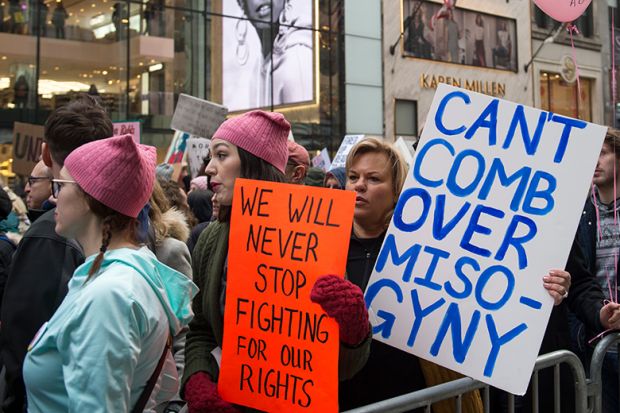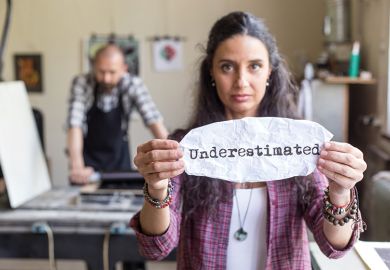A little under a year ago, Kate Manne, associate professor of philosophy at Cornell, was named one of Prospect magazine’s top 10 thinkers of 2019. She was in good company, and there’s something rather pleasing about seeing the other women in the top 10 (Kimberlé Crenshaw, Greta Thunberg and Alexandria Ocasio-Cortez) all cited in Entitled: How Male Privilege Hurts Women. Manne is a feminist who lifts up other women, with frequent intellectual hat-tipping, and uses her not inconsiderable privilege for good.
The book that won Manne Prospect’s accolade was her quite brilliant Down Girl: The Logic of Misogyny (2018). Entitled builds on the themes that Down Girl established. Structural inequality, systemic misogyny and, indeed, entitlement all come under scrutiny. This leads to some overlap between the two books, a familiarity that might bother some readers, but these are issues that we’re duty bound to keep revisiting; the injury they do to marginalised people is not even close to being ended.
Entitled opens with a characteristic moment of the zeitgeist. Its focus is the ineradicable “picture of entitlement” that was Brett Kavanaugh as he sought appointment to the US Supreme Court late in 2018. The Kavanaugh case exemplifies what Manne calls “himpathy”, a neologism that originated in Down Girl and which is defined here as “the way powerful and privileged boys and men who commit acts of sexual violence or engage in other misogynistic behaviour often receive sympathy and concern over their female victims”.
Such neologisms (“herasure” is another) are in equal parts irritating and effective; if you can name Brock Turner but not the woman he sexually assaulted, that’s “herasure” in action (she’s called Chanel Miller, for the record). Manne also has an ear for an effective turn of phrase. Misogyny, patriarchy’s “law enforcement” branch, is “a bit like the shock collar worn by a dog”, controlling every facet of the lives of women and girls. It “takes down women, and himpathy protects the agents of that takedown operation”.
Manne’s background in philosophy is apparent throughout Entitled. Her writing displays a keen understanding of how to increase the effectiveness of an argument by staging it forensically. Thus she “avoids a problem of psychological inscrutability” in defining misogyny by positioning it “as more about the hostility girls and women face, as opposed to the hostility men feel”. One of these phenomena is easily observable; the other is not. And it’s in such observations that Manne excels.
References to news stories abound, and analysis of them vividly serves her primary argument about the ubiquitous branches of entitlement, “the widespread perception that a privileged man is owed something”. These branches spread from the microcosm (lockdown will have thrown into sharp relief how housework is or isn’t shared equally in heterosexual partnerships) to the macrocosm (Manne is an “avid” supporter of US senator Elizabeth Warren and reflects on how her failure to conform to a pernicious “electability narrative” derailed her presidential campaign). At its heart, Entitled is concerned with the social and cultural mechanisms that have led so many people to take it as incontrovertible fact that they are owed almost everything by almost everyone else.
Manne traces this unequal transactional relationship between the owing and the owed, from Kavanaugh through many of the usual misogynist suspects – Trump, incels, mansplainers – in order to bolster her argument that “we expect too much from women. And when a woman we like or respect disappoints us, even in minor and forgivable ways, she is liable to be punished.” In fact, Entitled illustrates the myriad ways such punishments are carried out. Manne explores the disturbing side of what’s too often rather cheerfully called “mansplaining”, for example, the phenomenon that Rebecca Solnit famously described as being a key constituent of a male “archipelago of arrogance”. Many women reading this review will know what it means not to be heard – what it is to experience the actions of men whose “entitlement of the epistemic variety” sanctions them to take up all available space despite their lack of credentials to do so. In Manne’s formulation, “If the truth is not our property, then neither is authority” – and, inevitably, “Listening to women becomes superfluous.”
Entitled describes “the forces that hold misogyny in place”, pointing to how women “are punished and blamed” for “daring to come forward and speak out about the reality of the problem”. On social media, Manne has been subject to precisely the “destructive, toxic backlash” she writes about. This reaction against women who refuse to know their place in the exhausting dance of owing and owed will be painfully familiar to many of her readers. On 13 July 2020, she tweeted about how an earlier tweet announcing the imminent publication of Entitled “got mass reported and deleted”. The irony was not lost on her that this organised campaign served to reveal precisely what her book is about.
While the end of Down Girl’s analysis was pessimistic (“I give up,” Manne wrote in the conclusion. “I wish I could offer a more hopeful message”), Entitled finishes on a warily optimistic note: “Although I am still far from hopeful, I am not so despairing any more.” Manne attributes this glimmer of optimism to the positive responses that her first book received, and to becoming a mother. Indeed, the final chapter of Entitled focuses on what she wants for her daughter, and what, by extension, she wishes for all daughters everywhere. It’s the book’s philosophical destination, and so much more than a conclusion; it’s a fervent appeal for recognition that “entitlements can be genuine, valid, justified” and that “learning what one is entitled to is inextricably connected – or at least should be – with learning what one owes to others”.
Entitled is a relatively short book (about 50,000 words, including some pretty lengthy quotations) written in a crisp and immediately engaging tone. It’s perhaps not, strictly speaking, an “academic book”, but it is shored up by years of scholarly work – and we need to rethink what we mean by an “academic book” anyhow. That it will garner a large readership because of its sensible pricing and lucid style is to be celebrated. As Manne puts it, “it is important and worthwhile to fight. And we can fight better when we are clear about what we are up against.” Entitled is the perfect guide to fight an imperfect world.
Emma Rees is professor of literature and gender studies at the University of Chester, where she is director of the Institute of Gender Studies.
Entitled: How Male Privilege Hurts Women
By Kate Manne
Allen Lane, 288pp, £20.00
ISBN 9780241398784
Published 11 August 2020
The author
Kate Manne, associate professor of philosophy at Cornell University, was born in Melbourne, Australia, and grew up, she says, “about an hour away from the city, in a pretty rural area, replete with herds of kangaroos”.
She went to the University of Melbourne as an undergraduate and studied primarily philosophy and computer science. Within philosophy, she focused on logic, and the fact that her logic professors clearly believed in her “gave [her] a lot of confidence that [she] otherwise would have lacked”.
She went on to study philosophy in graduate school at the Massachusetts Institute of Technology, and it was there that Manne’s “interest in feminist and moral philosophy developed, thanks to the mentorship of Sally Haslanger, Rae Langton, Richard Holton and Julia Markovits. The various strands came together in my first book, Down Girl: The Logic of Misogyny [2018].”
Although that book had “a somewhat more academic feel” than Entitled: How Male Privilege Hurts Women, it still reached a readership well beyond specialists, and Manne says that she “love[s] writing for an audience that includes both philosophers and readers who, while interested in philosophy or feminist theory, don’t necessarily have a background in it. It forces me to try to be as clear as possible, and to clear away unnecessary verbiage and jargon that doesn’t really advance the argument.”
So what does Manne see as the role of those with philosophical expertise in addressing – and perhaps redressing – major injustices?
“I think philosophers’ main role in addressing injustice is to help us get clear on what we are actually up against,” responds Manne. “That kind of cultural analysis and critique are never going to be sufficient for addressing the pressing problems facing us today, of course, but they are necessary.”
Matthew Reisz
POSTSCRIPT:
Print headline: A feminist’s wary optimism
Register to continue
Why register?
- Registration is free and only takes a moment
- Once registered, you can read 3 articles a month
- Sign up for our newsletter
Subscribe
Or subscribe for unlimited access to:
- Unlimited access to news, views, insights & reviews
- Digital editions
- Digital access to THE’s university and college rankings analysis
Already registered or a current subscriber?







